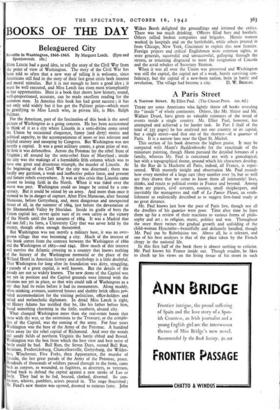BOOKS OF THE DAY
Beleaguered City
MISS LEECH had a good idea, to tell the story of the Civil War from the point of view of Washington. The story of the Civil War has been told so often that a new way of telling it is welcome, since Americans still find in the story of their last great crisis both interest and moral stimulus. But it is not enough to have a good idea ; it must be well executed, and Miss Leech has risen most triumphantly to her opportunities. Here is a book that shows how history, sound, well-proportioned, accurate, can be made excellent reading for the common man. In America this book has had great success it has not only sold widely but it has got the Pulitzer prize—which must be gratifying to Miss Leech who, in private life, is Mrs. Ralph Pulitzer.
For the American, part of the fascination of this book is the novel picture of Washington as a going concern. He has been accustomed to think of it as a city where Lincoln in a semi-divine coma saved the Union by occasional eloquence, funny (and dirty) stories and political sagacity, to the accompaniment of more or less relevant and helpful oratory and snooping by Congress. But Washington was not merely a capital. It was a great military centre, a great prize of war. At first it was defenceless. Across the Potomac lay the rebel State of Virginia ; all around lay the semi-rebel State of Maryland ; inside the city was the makings of a formidable fifth column which was to have one great and disastrous triumph, the murder of Lincoln. At the beginning of the Civil War the city was disarmed ; there was hardly any garrison, a weak and ineffective police force and present and future rebels everywhere. It was at this crisis that Lincoln came closest to losing faith in the North. When it was tided over the worst was past. Washington could no longer be seized by a con- spiracy. But it could be seized by an army. And more than once it seemed to be in danger of capture. After First Manassas, after Second Manassas, before Gettysburg, and, most dangerous and unexpected threat of all, in the summer of 1864, just before the devastation of the Shenandoah Valley by Sheridan. Inside its girdle of forts the Union capital lay, never quite sure of its own safety or the victory of the North until the late autumn of 1864. It was a Madrid that did not fall ; its forts, a University City that was never held by the enemy, though often enough threatened.
But Washington was not merely a military base, it was an over- grown village that was becoming a city. Much of the interest of this book comes from the contrast between the Washington of r86o and the Washington of 1865—and 1942. How much of this interest will survive the Atlantic crossing to a country that knows nothing of the history of the Washington memorial or the place of the Willard Hotel in American history and mythology is a little doubtful. That Washington for long after its foundation was dirty, straggling, a parody of a great capital, is well known. But the details of the parody are not so widely known. The new dome of the Capitol was not yet in position and the Capitol grounds were littered with the columns not yet in place, so that wits Zould talk of Washington as a city that had its ruins before it had its monuments. Along muddy, often stinking, avenues' scattered houses and shabby brick offices pro- vided accommodation for the visiting politicians, office-holders and exiled and melancholic diplomats. In detail Miss Leech is right, vet Henry Adams has testified that he, like his father before him, found something charming in the little, southern, absurd city.
What changed Washington more than the real-estate boom that came with the war, or the extensions to the Treasury, or the comple- tion of the Capitol, was the coming of the army. For four years Washington was the base of the Army of the Potomac. A hundred miles away lay the rebel capital of Richmond. And over the woods and sandy fields of northern Virginia the battle ebbed and flowed. Washington was the box from which the best view and best noise of battle could be had. Bull Run, the Seven Days, second Bull Run, Antietam, Fredericksburg, Chancellorsville, Gettysburg, the Wilder- ness, Winchester, Five Forks, then Appomattox, the murder of Lincoln, the last great parade of the Army of the Potomac, peace. Hundreds of thousands of soldiers passed through to the front, came back as corpses, as wounded, as fugitives, as deserters, as veterans, rushed back to defend the capital against a new stroke of Lee or Early. They had to be fed, housed, clothed, diverted. So con- tractors, whores, gamblers, actors poured in. The stage' flourished ; Mr. Ford's new theatre was opened, doomed to ruinous fame. John
Wilkes Booth delighted the groundlings and irritated the critics. There was too much drinking. Officers filled bars and brothels. Others rallied broken companies and brigades. Heroic women worked in hospitals and on the battlefields, while others poured in from Chicago, New York, Cincinnati to exploit this new frontier. Foreign princes and critical Englishmen were common sights, as were generals, successful and unsuccessful, galloping through the streets, or returning disgraced to meet the resignation of Lincoln and the acrid rebukes of Secretary Stanton.
When it was all over the Union was preserved and Washington was still the capital, the capital not of a weak, barely surviving con- federacy, but the capital of a new-born nation, born in battle and
revolution. The village had become a city. D. W. BROGAN.


























 Previous page
Previous page